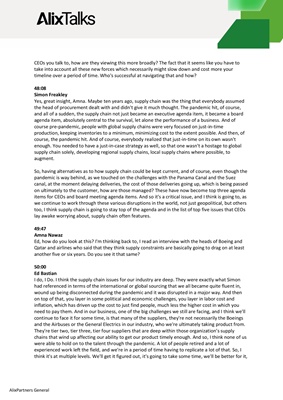
Amna Nawaz
So, Michael, only because you mentioned it, I need to ask, do you foresee in the future at a federal
level or maybe even a state level, I don't know how you manage this, something like an AI agency,
because it becomes so pervasive and so intertwined in every part of our lives?
44:08
Michael Kratsios
My general sense is - I think this came up in the news right around when the first congressional
hearings were happening earlier this year - but over time, what I've observed in Washington is
they've sort of cooled on that particular approach. And the reality is that at the end of the day, most
regulators have been working on their particular industry for quite a number of years, and you're
never going to have that deep level of expertise at one centralized agency. So, if suddenly AI
powered medical diagnostics had to be sort of approved by an AI agency, the speed and the quality
of that type of effort would be very different than the FDA. So, what we're seeing is, I think there's
been general sort of bipartisan consensus around maintaining kind of this industry specific use case
approach.
The challenge about all this, and I think the executive order touches a little bit on this with its call for
AI skills being brought into government, is that these agencies have never, in many cases, dealt with
AI power technologies. So, the expertise that you need in order for them to make very smart
regulatory decisions as technology develops is still not quite there. I think there's a lot of learnings
yet to be had, but I foresee them to sort of keep the status quo with the way that agencies are
structured at the moment.
45:19
Amna Nawaz
A couple more big picture questions I'd like to put to you both, and then I see more audience
questions coming in - I promise you, I will reserve time to get to those because they are very specific
and fascinating. But we're focusing a lot on business and business practices, I'd love to put to you a
lot of the concerns I hear here in Washington, in particular among government leaders and how
they're looking at it. National security officials in particular, talk about their concerns. I spoke to one
senior administration official who once told me nothing keeps him up at night like AI does because
it's just unknown, and there are so many concerns, especially when it comes to things like election
security and infrastructure security. More broadly, I think it's fair to say, as part of the conversation
around rising tensions with China in particular.
So, Simon, how do other business leaders, CEOs you talk to, how do they look at those conversations
and those bigger concerns? Do they see those concerns as valid and are they feeding their thought
processes and processes right now?
46:19
Simon Freakley
So, I think at a human level, we all worry about that. Of course, I don't know - many of us don't
know - I have to assume that AI has been used profoundly in issues of national defence for quite
some time. So, it's not as if this is a brand new development that now is going to recreate how we
think about the protection of our countries, whether generative AI, of course, will create another
level of threat, but also defence - I'll leave that to the experts. But I think for the business leaders
that I speak to on a regular basis, of course they're worried about those issues as a citizen of the US